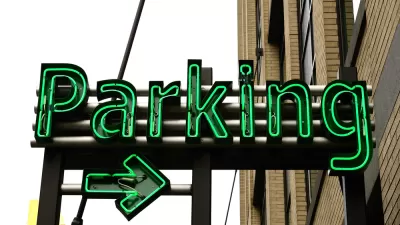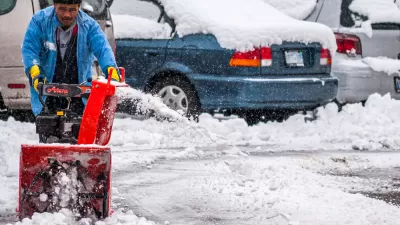Raleigh, North Carolina is the latest in a series of cities pursuing a significant departure from the 20th century planning status quo.

"The Raleigh City Council voted 6-to-1 Tuesday to begin a process to remove parking minimums and change parking maximums throughout the city," reports Anna Johnson.
Jason Hardin, a senior planner with the city, is cited in the article explaining how parking reform has been used as a tool for reducing vehicle trips and emissions in cities like Minneapolis and San Francisco.
“Over-reliance on driving contributes to climate change, degrades air quality and creates poor health outcomes,” Hardin said in a city memo. “Minimum parking requirements do the same by acting as an incentive to drive.”
Johnson also documents the City Council discussion that led to the final vote. While opposition was scant on the council, according to Hardin's memo, city planners are anticipating concerns about parking spillover into neighborhoods.
Raleigh Planning Department staff will still have to draft a text change for Planning Commission approval and then a final vote by the Raleigh City Council before parking reforms are implemented.
In January 2020, Planetizen picked up news that a then-newly elected, younger Raleigh City Council entered office with intentions to implement parking reforms as well as zoning reforms to spur Missing Middle Housing development. The Raleigh parking reform news follows just days after the City Council of Richmond, Virginia voted to take the first steps toward parking reforms.
FULL STORY: Raleigh may drop parking requirements for new development

Manufactured Crisis: Losing the Nation’s Largest Source of Unsubsidized Affordable Housing
Manufactured housing communities have long been an affordable housing option for millions of people living in the U.S., but that affordability is disappearing rapidly. How did we get here?

Americans May Be Stuck — But Why?
Americans are moving a lot less than they once did, and that is a problem. While Yoni Applebaum, in his highly-publicized article Stuck, gets the reasons badly wrong, it's still important to ask: why are we moving so much less than before?

Research Shows More Roads = More Driving
A national study shows, once again, that increasing road supply induces additional vehicle travel, particularly over the long run.

Judge Halts Enforcement of Anti-Homeless Laws in Grants Pass
The Oregon city will be barred from enforcing two ordinances that prosecute unhoused residents until it increases capacity and accessibility at designated camping sites.

Advancing Sustainability in Los Angeles County Schools
The Los Angeles County Office of Education’s Green Schools Symposium brings together educators, students, and experts to advance sustainability in schools through innovative design, climate resilience strategies, and collaborative learning.

Using Old Oil and Gas Wells for Green Energy Storage
Penn State researchers have found that repurposing abandoned oil and gas wells for geothermal-assisted compressed-air energy storage can boost efficiency, reduce environmental risks, and support clean energy and job transitions.
Urban Design for Planners 1: Software Tools
This six-course series explores essential urban design concepts using open source software and equips planners with the tools they need to participate fully in the urban design process.
Planning for Universal Design
Learn the tools for implementing Universal Design in planning regulations.
City of Moreno Valley
Institute for Housing and Urban Development Studies (IHS)
City of Grandview
Harvard GSD Executive Education
NYU Wagner Graduate School of Public Service
City of Cambridge, Maryland
Newport County Development Council: Connect Greater Newport





























